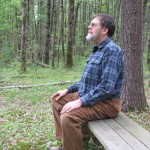I like to knit, but I hate the beginning of the process. Because I am not a standard size, and because I often knit from homespun yarn, I can never simply take a pattern and knit it according to the directions and hope it comes out right. I have to knit a gauge swatch, and then measure it in several places, and do the math. I have to do the match for how many stitches I get per inch, and then again to figure how many stitches to cast on, to add or reduce or how many pattern repeats come closest to the right size for my project (which, as I said, is never standard), and then I need to re-measure once I’ve knit three or four inches up from where I cast on, and again before I cast off, and…
You get the picture. I have learned through bitter and sometimes comical outcomes the absolute necessity to do the math. In life, too, as in knitting, I’ve learned to take as much control of any project as possible, from the very beginning.
Always Do the Math. Even if you hate it. Especially if you hate it. Life has taught me this.
But for the past nine years, my spiritual life has been encouraging me to let that go, and do the unthinkable: surrender the math. Accept that I am not in control.
This back injury of mine seems to be saying the same thing. Let me explain:
When I first became Quaker, in the initial flood-tide of my peace testimony, I would sit in worship just braced for a series of powerful demands from Spirit. I expected I would be told to turn my life upside down, and to rededicate my life to activism. And, while I was not eager for this to happen, I was at least ready for it.
And that’s not what I heard. Week after week, when I would center down and listen in for God, what I heard instead was something more like, “Go slow. Breathe. Be here.” And most of all, I heard the unthinkable: “Do less.”
Do less? You’re kidding me, right?
But I was hearing all these things about not outrunning my leadings, and teaching school was consuming more and more of my time, energy, and creativity anyway. I tried it. How faithful I was to that leading is difficult to say, actually–being told to walk barefooted over hot coals would have been something I was better suited to, constitutionally. But I at least tried.
Week after week, I would come in to Quaker meeting, slow down, center down, and listen for God. And after a while I began to feel present in a way I hadn’t felt present in my life in a long, long time. I began to feel small inside, but in a good way. I began to feel a sense of trust, in God or in Something, that I hadn’t let myself in a long time. And after a while, it was as if I was hearing a voice, saying to me, “You don’t have to be smart. You don’t have to be strong. You don’t have to be brave. You don’t have to be good. All you have to do is be here. Take my hand; trust. It’s going to be All Right.”
It got so that, sometimes, I’d find myself repeating those words to myself like a mantra at the beginning of meeting for worship. I don’t have to be smart. I don’t have to be strong. I don’t have to be brave. I don’t have to be good. And a feeling of relief would wash over me in waves.
I don’t mean that Quakers, or people generally, don’t need to summon strength or courage on occasion, or that becoming a better person isn’t part of what we’re hoping to do. And on one level, the words of my mantra are confusing to me, like the message to Do Less. (What do you mean, “I don’t have to be strong?”)
But there’s a part of me that somehow has gotten into the habit of thinking that, without my help, the sun won’t rise each morning, spring rains won’t fall, and bread will forget how to rise. It’s more than trying to be the leaven in the loaf–part of me thinks that I am the loaf, the whole thing.
It’s kind of a burden, having to make the sun rise every day. And working so hard at, it, focusing so hard on being strong and brave and clever and good, tends to blot out whatever else Spirit may be trying to tell me.
I’d thought I was doing pretty well with this lesson, on letting go and trusting Spirit a little more. (After all, it’s not as if I enjoy doing math all day long.) But I’m learning it again, or more, or deeper, since hurting my back.
Last week, in meeting, I settled into worship in my special chair–not really a chair, the Lafuma tilts effortlessly back into the approximate position in which infants sit in car seats, with as little strain on the spine as possible. It takes up a lot of room, and a lot of members of my meeting have gone to significant trouble to rearrange our entire meeting room–not just for me, no, but for me and the two wheelchair users and three Lafuma occupants who attend Mt. Toby. Benches have moved, and people can be very attached to where they sit in meeting each week. My settling in required a certain level of “unsettlement” on the part of others.
And I move slowly when I first emerge from a car. I physically can’t get to the members of the various committees in charge of this move to double-check that my chair is correctly placed. I have to trust: trust Peter to set it up, trust Jan or Nancy or somebody to let him know if it’s not in the right spot, if it’s going to block access for somebody else or cause a problem.
All I get to do is sit.
I can’t do the math. I can’t be sure I’m right.
I have, in fact, lost the option of trying to rush ahead of the consequences of all my actions and all my choices, double-checking and thinking everything through. I rely on others, and we may get it wrong, and all I can do is say, “Thank you.”
And, again, as I was sitting in my chair, trying to get beyond my fear of my own inadequacy, I could hear that Voice of Spirit, reminding me,” I don’t have to be smart. I don’t have to be strong. I don’t have to be brave. I don’t have to be good.”
My meeting loves me anyway. And so does God.
No math required.















